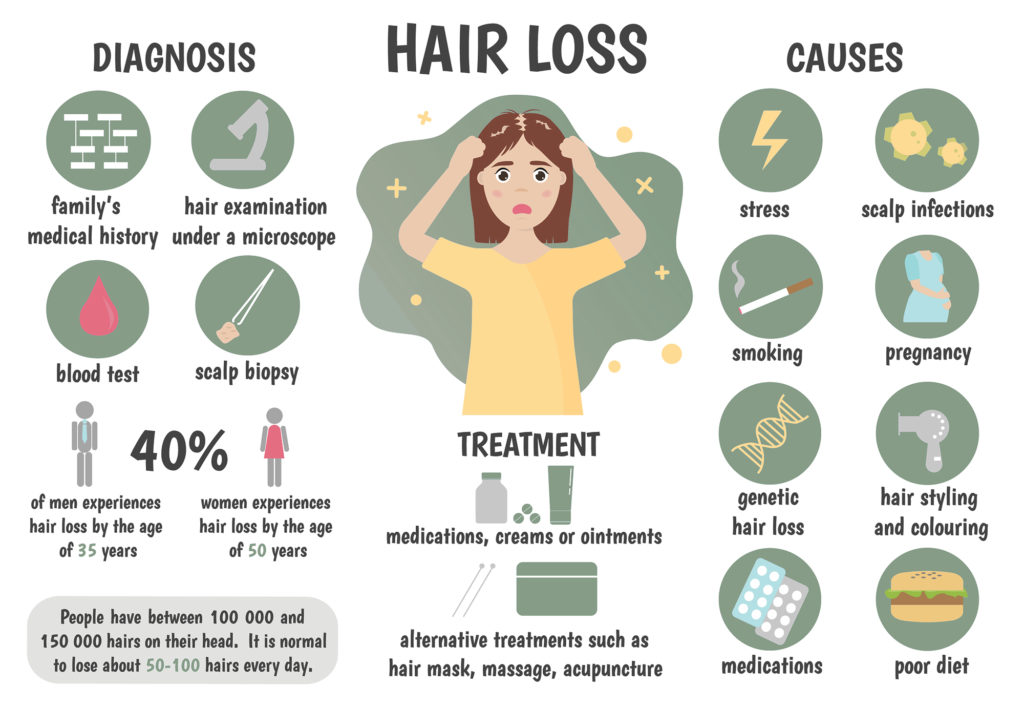There are many reasons why you might suddenly notice a thinning or loss of your hair.
We attempt to explain some of the common reasons, below. This list is not exhaustive, just some of the most common reasons for hair thinning and loss.
As with any health-related condition, you should seek the advice of your healthcare practitioner to rule out any serious medical conditions.

Bleaching
While bleaching and dyeing hair may cause your hair to break off at the root and fall out, this happens only in some cases. For the most part, the occasional hair treatment will not cause permanent damage.
In some cases, bleaching or dyeing your hair can cause damage to the hair.
This usually occurs if the treatments are performed too closely together. Bleaching then dyeing your hair can strip it of moisture and damage the follicle, cause the hair to either fall out from the root or to break out somewhere along the shaft.

Stress and Hair Loss
Stress is a major factor in surgery-related hair loss. During stress our bodies shunt nutrients to our heart, lungs, muscles and other vital organs. As a result, hair may be weakened and in some cases, hairfollicles may stop producing new hair. This is called telogen effluvium.
This is the most common form of hair loss and typically seen two to three months after a major body stress, such as major surgery, chronic illness, or significant infection. Other causes, such as sudden change of hormone levels, especially in women after childbirth, or stopping hormone replacement. Hair may fall out from all parts of the scalp, and noticed on your pillow, shower/tub, or on a hairbrush. Scalp hair may appear thinner, but it is unusual to see large bald spots.
Unfortunately, all surgery involves some stress so it is important to minimize it to the extent possible. Suggestions like setting aside time in your day to both relax and exercise (walking in particular is a great stress reliever), taking part in calming activities all help. Educate yourself about your surgery and its recovery and discuss fears and concerns about your surgery with doctor, and try to focus on the final positive outcome.
Diet and Metabolism
During healing your body metabolism increases and there are increased needs for more nutrients such as protein, iron, zinc and biotin among others. Limited amounts will be diverted to wear it is needed the most with hair not being one of these places. To reduce the effects of stress on your hair, try to eat a more nutritious diet. Extra fruit and vegetables may help especially foods rich in zinc, biotin and (especially in menstruating females), and iron. Special perioperative vitamins made for this purpose as well as Arnica Montana and Bromelain may help to minimize inflammation.

Postpartum Hair loss
Postpartum hair loss is a normal –and temporary – postpartum change that is unrelated to breastfeeding. Most women will return to their usual hair growth cycle between 6 and 12 months after birth.
Normally, around 85-95% of your hair is in the growth phase at any point in time, but the hormonal changes during pregnancy stimulate an increase in the percentage of hairs in the growth phase. As a result, many women enjoy thicker hair during pregnancy, as more hairs than normal are growing and fewer than normal are resting/shedding.
With the birth of your baby (and the hormonal changes that accompany birth), a larger number of hairs than normal enter the resting phase. Since the resting phase is followed by hair shedding (and regrowth), new mothers will experience greater than normal hair loss once the resting phase ends.
Postpartum hair loss commonly starts at around three months after birth. The amount of time between childbirth and the onset of shedding corresponds to the length of the resting phase of hair growth (between 1 and 6 months, with an average of three months). The hair loss can seem more extreme if your hair grew much more than normal during pregnancy, or if you have long hair. Most women will return to their usual hair growth cycle within six months, or between 6 and 12 months after birth.
If you feel that your hair loss is greater than the norm, or if things are not back to normal by the time your baby is 12 months old, then see your doctor. Excessive hair loss can be caused by common and easy-to-remedy postpartum conditions such ashypothyroidism (low thyroid hormone) or iron-deficiency anemia.
Hair Loss Caused by Menopause/Hormones
Menopause is a natural biological process that all women experience at some point in their lives. During this time, the body goes through numerous physical changes as it adjusts to fluctuating hormone levels. Many women have unpleasant symptoms during menopause, including hot flashes, mood swings, and Insomnia. Hair loss is another common occurrence.
Hair loss tends to be more subtle in women than it is in men. Most women experience overall hair thinning rather than noticeable bald spots. The thinning can occur on the front, sides, or top of the head. Hair may also fall out in large clumps during brushing and showering.
Research suggests that hair loss during menopause is the result of a hormonal imbalance. Specifically, it’s related to a lowered production of estrogen and progesterone. These hormones help hair grow faster and stay on the head for longer periods of time. When the levels of estrogen and progesterone drop, hair grows more slowly and becomes much thinner. A decrease in these hormones also triggers an increase in the production of androgens, or a group of male hormones. Androgens shrink hair follicles, resulting in hair loss on the head. In some cases, however, these hormones can cause more hair to grow on the face. This is why some menopausal women develop facial “peach fuzz” and small sprouts of hair on the chin.
For women going through menopause, the cause of hair loss is almost always related to hormonal changes. However, there are many other factors that can contribute to hair loss during menopause. These include extremely high levels of stress, illness, or a lack of certain nutrients. Diagnostic blood tests that can help rule out other causes of hair loss include thyroid tests, and/or a complete blood count.
Birth Control and Hair Loss
Birth control pills can cause hair loss in women who are especially sensitive to the hormones the pill contains or who have a family history of hormone-related hair loss.Hair normally grows in cycles. Anagen is the active phase. During this phase, your hair grows from its follicle. This period can last for two to seven years.
Catagen is the transitional stage when your hair growth stops. It lasts for about 10 to 20 days.
Telogen is the resting phase. During this phase, your hair doesn’t grow. Between 25 and 100 hairs are shed daily in this phase, which can last for up to 100 days.
Birth control pillscause the hair to move from the growing phase to the resting phase too soon. This form of hair loss is called telogen effluvium. Large amounts of hair can fall out during this process.
If baldness runs in your family, birth control pills can speed up the hair loss process.
Other hormonal birth control methods can also cause or worsen hair loss. These methods include:
- hormone injections, such as Depo-Provera
- skin patches, such as Ortho Evra
- progestin implants, such as Norplant
- vaginal rings, such as NuvaRing
Trauma Related Hair Loss
Both women and men can experience partial or full hair loss due to depending on their age, general health, and other factors. Although the hair usually grows back, this type of hair loss can sometimes be permanent. The hair can fall out in patches, all at once or just simply become thinner all over the scalp. Hair loss caused by emotional trauma or stress might go on for as long as you are experiencing the shock or heartbreak and then for about another seven to eight months after that.
When people experience extreme emotions for a prolonged period of time their body produces neurotransmitters that cause cortisol levels to rise. This is because the upset or panicked individual is always in a state of “fight or flight.” This, sometimes, causes the body to produce hormones that trigger the immune system. In some people, the immune system attacks the hair follicles, which causes them to become inflamed, and then your hair falls out.
Common situational causes of this type of hair loss are:
- Heartbreak due to the breakup of a relationship
- Grief due to the death of a boyfriend or spouse
- Grief due to the death of a parent or family member
- Grief due to the death of a child
- Moving, especially if you are not happy with your new location
- Being in a high-stress job in which you witness human misery often, such as being a paramedic, fireman or emergency room worker
Post Surgery Hair Loss
To understand why and how hair loss following surgery can occur, it is first necessary to understand the normal hair cycle. For example, everyone is constantly shedding hair (normal can be 100 scalp hairs shed per day) and this rate changes depending on many factors including surgery.
Hair bulbs, the living part of hair, have three main phases: growth phase (anagen), involution/regressing phase (catagen), and the resting/quiescent phase (telogen). For the scalp the growth phase under normal conditions is 2-8 years, involution phase 2-3 weeks, and resting phase around 3 months.
During times of stress such as surgery, the majority of the hair can prematurely enter the rest phase, telogen, resulting in accelerated temporary hair loss. This is called telogen effluvium.

Hormonal Changes and Hair Loss
Disruption to your normal hormonal cycle can result in hair loss. Though more pronounced in women but it can also affect men.
Prolonged period of bed rest after surgery can affect this cycle, as can some of the drugs you may be given to help you heal after your operation.
Limited exercise, such as walking frequently, is beneficial. Your doctor can let you know your limitations regarding exercise. It also helps to get back to eating in as regular a pattern as possible in the days after the surgery is complete.
Anaesthesia and Hair Loss
It is inconclusive whether anaesthesiacauses hair loss, though both patients and many doctors believe there may be a link. If so, it is more likely with lengthy anaesthetics periods lasting several hours rather than following shorter operations.
Limited research suggests that because anaesthesiacan slow down cell division, those cells which rely on fast cell division, such as hair follicles, are pushed into their resting phase. The good news is that this is temporary and the hair follicles will soon switch back to their normal irregular hair growth pattern.
A large variety of things are associated with hair loss, including several diseases and hundreds of different drugs.
Surgery
Change of blood flow, and scarring (deep and at the skin level) can cause hair follicles to shut down restricting new hair growth. The current hair may go in the dormant phase (telogen) and fall out (telogen effluvium). Areas involved with scarring may result in areas of permanent loss of hair.
Medications
Literally hundreds of drugs may affect the growth of hair including some of which are necessary for surgical procedures. These can be direct effects or indirect effects (e.g. allergic reaction to a medication). Once the offending medication is stopped hair growth should slowly return to normal.
Other Surgical Factors
Other factors such as infection (bacterial, viral, or fungal), scratching, or too much pressure can result in hair loss after surgery (Positional Alopecia).
All surgery represents an increased risk of infection. Once identified it needs to be treated quickly as can cause sudden hair loss.
Positional Alopecia is uncommon, but can occur when the head is kept in one position for a prolonged time interval. This limits blood supply to the skin and hair follicles. Fortunately, when you sleep, you naturally move your head at intervals. This does not occur with surgeries that do not require or purposely restrict head movement. Typically this would apply to very lengthy surgeries lasting more than 6 hours.
The good news is that post-surgical hair loss doesn’t happen to most patients and, when it does, for most it comes back to normal within months.





